2025-26 High School Writing Contest Entry Form
Please use the form below to submit your entry for the 4th Annual High School Writing Contest, Crossroads.
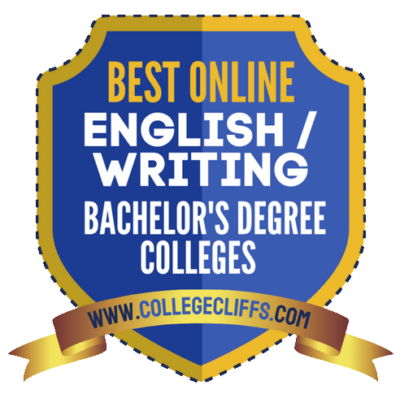



The English program offers courses in five areas of concentration (children’s and young adult literature, creative writing, film studies, literary studies, and rhetoric/professional writing) that lead to a four-year Bachelor of Arts degree. The program in English aims to prepare students for graduate school, professional school, and careers in fields where effective communications skills are required. Programs in English also support the University’s mission to deliver “accredited degree programs and comprehensive learning experiences to prepare students for regional and global professions.”
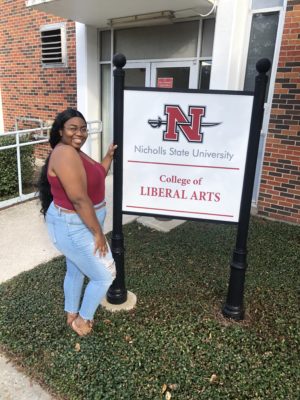
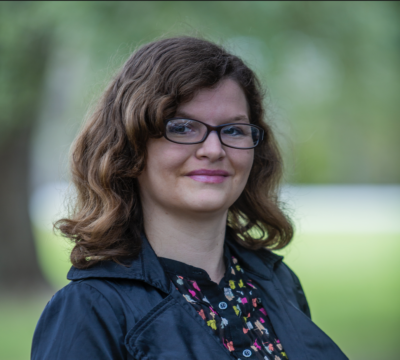
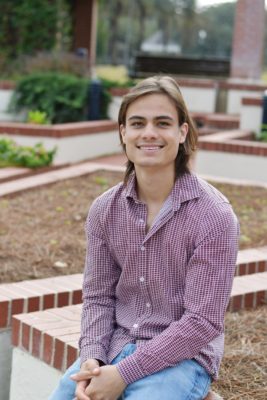



And don’t forget to fill out your Four-Year Career Plan from Nicholls Career Services.
The mission of the Bachelor of Arts in English program is to offer courses in five areas of concentration (creative writing, film studies, literary studies, rhetoric/professional writing, and children’s and young adult literature) that lead to a four-year Bachelor of Arts degree. The program in English aims to prepare students for graduate school, professional school, and careers in fields where effective communications skills are required. Programs in English also support the university’s mission to deliver “accredited degree programs and comprehensive learning experiences to prepare students for regional and global professions.”
Bachelor of Arts English Concentrations available in:
The Bachelor of Interdisciplinary Studies program provides students with opportunities to design a course of study that draws cross-disciplinary connections among disciplines to help them realize their academic, personal, and professional aspirations. Because students are required to demonstrate depth in an academic area and to take courses in oral and written communication and the humanities, the Bachelor of Interdisciplinary Studies provides an interdisciplinary emphasis that prepares students for entry into postgraduate studies and the professional world with a global focus. The program also cultivates greater opportunities for service learning and leadership initiatives across all disciplines and coordinates campus-wide development of interdisciplinary minors and activities available to all majors.
The Associate of General Studies program meets the needs of exploratory students who have yet to decide upon a major and those students who may not be able to commit to a four-year program because of financial or personal challenges. The program offers an avenue for students to complete their general education courses while exploring four-year programs, as well as associated career possibilities.
Students can also earn a Bachelor of Arts in Secondary Education with a concentration in English or French Education through the Department of Teacher Education.
*** To view a detailed list of our English Degree program Concentration Requirements, along with a Suggested Course Sequence, click here.
Dr. Todd Kennedy – Film Studies Advisor
Dr. Patrick Perkins – Athletics Advisor
Dr. Kathy Conner and Dr. Jacyln Stephens – Creative Writing Advisors
Dr. Alex Fabrizio and Dr. Scott Banville – Literary Studies Advisors
Dr. Bryant Smith – Foreign Languages Advisor
Ms. Ali Cortez – Children’s & Young Adult Literature
Dr. Scott Banville – Undergraduate Advising Department Coordinator and Nicholls Online Advisor
Dr. Erick Piller – Writing and Rhetoric Advisor
Ms. Karen Cheramie – Interdisciplinary Studies Program Coordinator
There are several myths about Interdisciplinary Studies degrees. One is that switching to an Interdisciplinary Studies curriculum from another major will somehow allow a student to graduate earlier. This is not necessarily true. As with any other curriculum switch, a student may lose or gain hours with each change. The outcome of a switch depends on several factors such as the time in a student’s career when the switch is made.
What all of this is saying is that an Interdisciplinary Studies degree is a degree all to its own, with certain strengths and weaknesses just like other degrees. For many students, understanding a degree’s strength is as simple as understanding a chosen field. You know that after you graduate in accounting, accounting is your chosen field. You leave college assuming that the world of work and the professions will assume that your training is in accounting. Thus, there is a strength — a presumption that you are an “accounting person.” But there is also a weakness — the presumption that all you know is accounting.
So it is with Interdisciplinary Studies. There are weaknesses with the degree and strengths, especially when others are interpreting what you supposedly know.
However, it is true that Interdisciplinary Studies students, as a rule, are at a bit of a disadvantage from the start because they have no obvious major field of study, no “major name.” An Interdisciplinary Studies student must be ready for the question, “Just what is your degree in, anyway?”
How is an Interdisciplinary Studies student to answer this question?
More than any other student, an Interdisciplinary Studies student must give consideration to the degree itself, must be ready to explain the strengths and the concentration of knowledge to the outside world. This preparation is best done with a thorough understanding of what you’ve studied for four or five years. While the Interdisciplinary Studies “capstone” course IDST 410 is designed to help you understand your degree and to prepare for the world that awaits you after college, there are a few things you should think about before taking that course.
First, let’s look at what you’ve been studying in order to see where your strengths lie.
Knowledge You Have as B.I.S. Graduates:
After taking a close look at your studies, you can see that you have “majored” in a general university education. You have also chosen to concentrate in a certain field to the extent that you have a minor or have demonstrated educational depth in that field. What you may not realize is that your “general university major” has another name at other schools. At many universities, students can major in an area called “Liberal Arts.” A Liberal Arts major is someone who can be presumed to have liberal arts as a field of study.
After leaving a university, liberal arts majors are ready to find jobs where communication and problem-solving skills are needed. They are ready to find jobs where employers are looking for all-around “university thinkers.”
Let’s take a closer look at what a Liberal Arts major is.
Liberal Arts: studies in the humanities, mathematics, and the social and natural sciences as distinct from professional or technical subjects.
Not only is there a dictionary definition of liberal arts, but there is also a website designed by people who think that a strong liberal arts degree is the very essence of a valuable college education. The influence of this kind of thinking is found at most universities because all students are required to take “core courses” in liberal arts in order to graduate. All students at Nicholls do just that. All students are required to take “General Education” courses. These courses are based in the liberal arts.
It might be said that an Interdisciplinary Studies graduate has majored in an overall university education based on the liberal arts curriculum.
Those of you who are interested should click on the website below and visit the national liberal arts site for the organization known as The American Academy for Liberal Education. The words found there will help Interdisciplinary Studies students explain the strengths of their degree.
The pages that follow are taken from this website. Take a look at what is being said. Your liberal arts degree comes with skills that many employers are looking for.
The Academy’s Mission, General Education and Curriculum, and Teaching and Educational Resources standards seek to ensure that accredited institutions provide their students with the educational means and opportunities essential for developing the characteristics of a liberally educated person. The Academy’s unique Liberal Learning Assessment standards invite institutions to reflect and report on the ways their educational programs actually foster the growth and flourishing of such characteristics in their students. Chief among these characteristics are the ability to reason and communicate effectively, possession of a certain breadth and depth of knowledge, and a love of learning.
The Academy’s Liberal Learning Assessment standards do not prescribe specific methods or instruments for assessing student learning. They seek, instead, to identify certain key characteristics of intellectual and personal achievement in liberal learning – Effective Reasoning, Broad and Deep Learning, and the Inclination to Inquire – and then to suggest some clear indicators or criteria of achievement. These characteristics, along with their associated indicators and criteria, should be recognizable across a broad spectrum of liberal education models.
An education in the liberal arts always seeks to develop students’ abilities to recognize and to think clearly about important issues and questions. The ability to reason effectively includes certain foundational skills or abilities (e.g., fluency in reading, writing, and oral communication, mastery of the basic principles of logical, mathematical, and scientific reasoning), as well as higher-order capacities for formulating, analyzing, integrating, and applying arguments and information.
A liberally educated person should possess a rich fund of meaningful knowledge, as well as the ability to compare and integrate new or different areas of knowledge in fruitful ways. An institution’s general education curriculum should impart a broad foundational knowledge of the various liberal arts and sciences. Students should also experience the depth of learning that comes from a sustained, progressive exploration of the distinct modes of inquiry belonging to one or more of the major disciplines. Through such studies or their equivalents, students acquire the ability to relate disparate parts of the curriculum to one another, as well as to integrate knowledge gained across different fields of study.
An education in the liberal arts and sciences is more than the mere accumulation of knowledge and skills. It fosters and encourages the student’s desire for seeking out and acquiring important knowledge and skills, both for their own sake and for the good they contribute to our common and individual lives. For this reason, a disposition for asking incisive and insightful questions and for pursuing enriching and useful skills is perhaps the surest sign of a liberally educated mind.
The student should demonstrate:
The student should show:
The student should demonstrate:
Resumes generally stress a person’s education in light of specific skills and areas of intense study. The skills for Interdisciplinary Studies students are those skills listed by the the American Academy for Liberal Education. Students who stress these skills on their resumes will find that employers are always looking for “liberal arts people.” Sometimes, students might have to show employers the proper way to interpret a liberal-arts-based resume. But that’s the purpose of all resumes: It’s the students’ responsibility to show that they are ready to put communication and problem-solving skills to work.
Please use the form below to submit your entry for the 4th Annual High School Writing Contest, Crossroads.
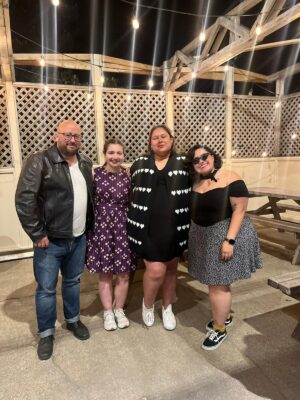
Nicholls French students are thriving this summer through their French immersion work at Université Ste-Anne in Clare, Nova Scotia. Annelle Fletcher, Erica Chavez, and Katherine
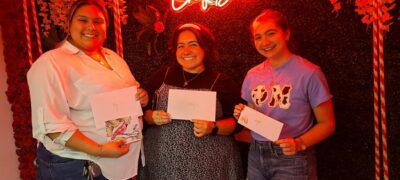
Very best of luck to our incredible French students on their studies abroad this summer. Annelle Fletcher, Erica Chavez, and Katherine Dean are participating in

Dr. Erick Piller is one of Nicholls’ most engaged and dynamic faculty members. A product of Loyola University in New Orleans, Warren Wilson College, and the University of Connecticut, Erick co-directs the department’s writing program. He specializes in rhetoric and composition, writing pedagogy, and writing program administration, and he is a founding member of the Creative Writing Studies Organization. Erick presented at the 2021 Conference on College Composition and Communication. He participated in the panel “Anatomies of Writing Programs: Sustaining Their Institutional Common Places” and spoke about recent changes to the Nicholls writing program. We’d also like to congratulate Erick on being awarded the 2021-2022 CTE Faculty Fellow. Professor Piller will be providing a year-long professional development focused on writing across the curriculum and encouraging faculty to adopt more writing within their disciplines.

Dr. Robin White is an Associate Professor who specializes in teaching both English and French courses here at Nicholls. Robin is a graduate of Evergreen State College and Louisiana State University and has a deep-seated passion for Louisiana culture, coupled with an unbridled enthusiasm for good coffee. Her research interests include Creole Louisiana, racial descriptors, ethnographic discourses, and travel literature. As an advisor and mentor to the Nicholls French Club, Robin arranged a visit for the group to tour the Laura Plantation earlier this year to explore its history and effect on Louisiana culture. An accomplished writer, Robin had her poem and drawing entitled “Enri” accepted for publication in an Editions Tintamarre collection of Louisiana poetry writing in Louisiana creole. Additionally, Robin served as a collaborator in translating the Camille Lebrun novel, Friendship and Devotion, or Three Months in Louisiana, which became available for purchase in August 2021. She is also scheduled to chair a panel on Louisiana and Caribbean literature in March 2022, at the Northeastern Modern Language Association annual conference.
Graduates from the Department of English, Modern Languages, & Cultural Studies are highly attractive to employers and graduate schools. Knowing how to communicate, especially in a foreign language, is valuable in every field and in our global marketplace.
Administrative Officer
Advertising Occupations
Archivist
Author
Broadcasting/Communications Occupations
Community Relations Worker
Computer Systems Analyst
Copywriter
Critic
Editor
Education Occupations
Film Editor
Foreign Service Officer
Freelance Writer
Information Manager
Interpreter
Job Analyst
Journalist
Lawyer
Librarian
Literary Agent
Magazine Publisher
Newspaper Editor
Novelist/Writer
Personnel Director
Proofreader
Public Relations Manager
Public Relations Specialist
Radio/Television Coordinator
Reporter
Scientist
Speech Writer
Teacher/College Professor
Technical Writer
Translator
Advertising Companies
Aircraft Industry
Banks
Book Publishers
Businesses
Broadcast Media/Radio
Colleges
Commercial/Specialty Magazines
Company/Independent Newsletters
Corporate Communications Departments
Educational Institutions
Federal Agencies
Community Colleges
Legal Firms
Local and State Government
Magazine Publishers
Museums
Newspapers
Non-profit Organizations
Public Relations Firms
During your four years as an undergrad, you should be working on improving skills that will help you with your future career.
Use our four-year Career Plan to help guide you through your college journey towards a successful career.
Congratulations to our 2020/2021 College of Liberal Arts award winning students:
Outstanding Graduate in Creative Writing – Lexie Pellegrin
Outstanding Graduate in Film Studies – Zoe Cancienne
Outstanding Graduate in Literary Studies – Caitlin Jones
Outstanding Graduate in Rhetoric and Writing – Vrixton Phillips
Academic Excellence in French – Sara Guillot
Academic Excellence in Spanish – Taylor Hodson
Outstanding Graduate in Interdisciplinary Studies – Zoe Cancienne
2020 Colonel Leaders and Scholars Award (Formerly Who’s Who)
The Department of English, Modern Languages, & Cultural Studies is pleased to announce that it has three students who have been selected to receive the 2020 Colonel Leaders and Scholars Award. Congratulations to Ethan Henry, Taylor Hodson, and Caroline Pontiff.
Honors Banquet ~ Spring 2020:
Each spring, the Department of Languages and Literature honors its outstanding students at the College of Arts & Sciences Honors Convocation Banquet. We extend a special “thank you” and congratulations to all recipients and presenters. Click here for the complete article.
The Katherine ‘Kat’ Tracy Award, Outstanding Graduate in Creative Writing– Kaden Vanderbrook
Outstanding Graduate in Literary Studies– Collin Brazan
Outstanding Graduate in Writing & Rhetoric– Caleb Moll
Outstanding Achievement in French– Sarah Oubre
Outstanding Achievement in Spanish– Megan Henshaw
The department’s majors and minors are encouraged to apply for local, state and national scholarships offered by professional organizations. Other scholarships are available through the Financial Aid office.
SCOTT BANVILLE
Conferences:
“Piloting the Brave New World of Developmental Writing: Co-Requisite Enrollment at a Regional State University” with Ellen Barker and Louie J. Charpentier. Council of Writing Program Administrators, Savannah, Georgia, July 17-21, 2013.
“Tony Pastor and his Theaters: Crossroads of Nineteenth-Century Transatlantic Popular Culture.” North American Victorian Studies Association. “Victorian Networks” at the University of Wisconsin. Madison, WI. Sept 27-30, 2012.
“The Real World as New Media Classroom: Four Takes on Digital Citizenry.” Computers and Writing 2011. May 19-22, 2011. University of Michigan, Ann Arbor.
Writing Program Administrators Conference. “Frameworks for Success,” July 14-17, Baton Rouge, LA., attended on behalf of the Department of Languages and Literature to gather information for continued development of First Year Writing Program.
Scholarly Publications:
‘A Bookkeeper, Not an Accountant’: Representing the Lower Middle Class from Victorian Novels and Music Hall Songs to Television Sitcoms.” Journal of Popular Culture. 44.1 (Feb. 2011): 16-36.
“‘The Daily Male’: Vesta Tilley and the Performance of Masculinity on the Victorian Music-Hall Stage.” Hunks, Hotties and Pretty Boys: 20th Century Representations of Male Beauty. Eds. Steven Davis and Maglina Lubovich. Cambridge: Cambridge Scholars Publishing, 2008. 112-142. Print.
“Ally Sloper’s Half Holiday: The Geography of Class in Late-Victorian Britain.” Victorian Periodicals Review 41.2 (Summer 2008): 150-173. Print.
Published Poetry: “North & East of Boise,” “Desert Rising,” and “Word by Word.” North Dakota Quarterly. 76.3.
Recent Book Reviews:
Review of The Forgotten Writings of Bram Stoker, ed. John Edgar Browning. Victorian Periodicals Review 46.2 (Summer 2013): 283-84. Print.
Grants Awarded: Student Technology Fee Grant, Nicholls State University. $34,783.23. Upgrade EMLCS computer classroom: PEL 131. October 2020.
Hobby Family Fund Fellow at the Harry Ransom Center, University of Texas at Austin. $3,000. Research the business and personal papers of Tony Pastor. June 2012.
Student Technology Fee Grant, Nicholls State University. $37,509.70. Upgrade Languages and Literature computer classroom: PEL 120. April 2012.
Student Technology Fee Grant, Nicholls State University. $38,355.20. Upgrade Languages and Literature computer classroom: PEL 131. April 2011.
Dean’s Library and Equipment Grant. $6,100.00 to upgrade faculty computers and equipment for Languages and Literature’s Multimedia Project Studio, April 2011.
Student Government Grant. $418.29. Assisted undergraduate student Gavin Johnson in applying for the grant for a flat bed scanner for Languages and Literature’s Multimedia Project Studio, March 2011.
KATHERINE CONNER
Scholarly Publications: “Neshoba,” Shenandoah.” Washington and Lee University’s literary magazine
“Panther Stalks Hinds County.” Blackbird, Virginia Commonwealth University’s literary magazine
“The Giraffe Keeper.” Copper Nickel
“Scraps,” Burnt Bridge (nominated for Pustcart Prize)
Book Reviews: My Bright Midnight by Josh Russell in The Southeast Review
How Clarissa Burden Learned to Fly by Connie May Fowler in The Southeast Review
TIFFANY DUET
Grants Awarded: $120,000 LaSIP Grant, “Incorporating WETSHOP in the Louisiana Science Curriculum, 2011-2012.” (Project Director)
RICHMOND EUSTIS
Awarded:
Fulbright Scholarship, Jordan Fall 2015
Louisiana State University’s Distinguished Dissertation Award : Reading Out of Doors: How Nature Becomes Text and Vice-Versa (2010)
Scholarly Publications:
“Buying the Wilderness: The Commodification of the Sublime” Perspectives, Vol. 4 (UC, Dublin), (Fall 2012)
“Songs for Maria Luisa” (translations of four poems by Basilio Fernández), Stand, Vol. 8 (2)pp. 27-29 (Spring 2008)
Conferences: “Ventoux’s Oracle: Reconsidering Petrarch’s Ep. Fam. IV.1”: International Congress on Medieval Studies, (Kalamazoo, May 2012)
“Convivencia in Place and Poetry: Mozarabic Poetry of al-Andalus”: Sociedad Expañola, (New Orleans, Nov. 2010).
“The Gita and the Concord: Resurrecting River and Language in H.D. Thoreau’s A Week on the Concord and Merrimack Rivers”: Southern Comparative Literature Association (Baton Rouge, 2010)
“Garden and Wilderness: Thoreau and Knowing Beans”: Association of Literary Scholars and Critics Colloquium (Baton Rouge, LA September 2010).
Seminar Organizer: “Polluted Places/Impure Spaces”: American Comparative Literature Association (New Orleans, 2010) -“Mountain Awe: Petrarch and Thoreau at the Limits of Language”: Association of Literary Scholars and Critics Colloquium (Baton Rouge, LA, March, 2010)
Seminars: “Taking it Outside: Reading and Walking in Pursuit of Thoreau”: Northeast Modern Language Association, Boston, MA (2013)
“Life Without Principle’ and the Birth of the Wild Pastoral”: Association of Literary Scholars, Critics, and Writers, Athens, GA (2013)
Reviews: “Dieter Schultz. Emerson and Thoreau, or Steps Beyond Ourselves: Studies in Transcendentalism.” (Heidelberg: Mattes Verlag, 2013), for Ecozon@: European Journal of Literature, Culture, and Environment (fall 2012)
Invitations: Sociedad Espanola de Nueva Orleans Cervantes Day Lecture: “The Perils of Don Quixote.” (2013)
Joined: National Outdoor Leadership School as field instructor.
Performances: Ghost and Gravedigger in Nicholl’s State University’s campus production of “Hamlet”. (spring 2013)
TODD KENNEDY
Scholarly Publications: “Off with Hollywood’s Head: Sofia Coppola as Feminine Auteur.” Film Criticism. XXXV, 1 (Fall 2010): 37-59.
Reviews: “Films by Gordon Ball.” Studies in American Culture. (Fall 2011)
Conferences: “On the Road to ‘Some’ Place: The Postmodern Hobo – Hero in Sofia Coppola’s Somewhere,” presented at Popular and American Culture Associations of the South Conference, October 2011.
“Remixing the Relationship between Media and Composition: Digital Rhetoric for a Visual Age.” Conference on College Composition and Communication. March 17-20, 2010. Louisville, Kentucky.
NICK MAINIERI
Scholarly Publications: “Bird Shot.” Southern Review. (short story)
“Flint,” Southern Review. (short story)
“Whose Will They Be?” Ellipsis (short story)
“Landscapes,” Fiction: Review. (essay)
Major League Final Standings Projection: “Major League Central, Final Standings,” in Hobart
Awarded: Distinction at University of New Orleans for MFA Thesis, short story collection, The Tools of Ignorance.
JENNA PORTIER
Scholarly Publications: Profile on Kevin George for Voila! (article)
Six poems published in the 13th (2011) Jubilee Jambalaya publication.
Literary Judge: “Poetry Out Loud” competition hosted by the Houma Regional Arts Council
ABIGAIL SCHERER
Scholarly Publications: “Celebrating Idleness: Antony and Cleopatra and Play Theory.” Comparative Drama
“Embracing Lucia: Reading Robert Herrick’s ‘The Vine.’” The John Donne Journal
“Otiose Leisure: Idleness and Idolence in British Literature,” chapter in Idleness in Early Modern England, forthcoming
Conference:
“William Faulkner’s ‘Barn Burning”: Ante-bellum Architecture and ‘Negro Sweat,’” presented at 36th Southern Comparative Literature Association Conference.
BRYANT SMITH
Co-Founder: “Tac Tac in 218″. Featuring a selection of international films for students. (spring 2013)
Conferences: “Cradle Rocker to Knife Wielder: The Evolution of the Horror Heroine.” South Central Modern Language Association (November, 2012)
Co-host of the Breakout Session: “Understand Our Students’ Language: A Closer Look at South Louisiana English.”
MYRON TUMAN
Conferences: “Travelin’ Light: Teaching Travel Lit Online.” Louisiana Conference on Composition, March 19, 2011.
Software Production: Created first cloud-based software system for managing writing assignments: courseDocs (courseDocs was also represented at three prestigious conferences on writing: Louisiana Conference on Composition, March; Conference on College Composition and Communication, April; Writing Program Administrators’ Conference, July.
KERI TURNER
Grants Awarded: $183,456.00 for “Teaching What Matters: Building Literacy Skills Using Content Reading and Writing Knowledge” (received the Top Ten Grant Writer’s Award from OSRP).
JAY UDALL
Scholarly Publications: Recent poems have appeared in North American Review, Verse Daily, International Psychoanalysis, Rattle, and The Pedestal.
“Anonymous.” Prairie Schooner (Winter 2012)
“Grief Songs.” Spillway (Winter 2012)
“Exodus.” Cincinnati Review (Spring 2013)
“Before Leaving.” Cumberland River Review (Spring 2013)
“Fledging,” “Showing Forth,” “Reading Blind.” Red Earth Review (Summer 2013)
“To an Armadillo,” “Louisiana 1 South in Winter.” The Gulf Stream: Poems of the Gulf Coast (Summer 2013)
“Jesus Walks in Blue Above Louisiana” and “Blessing of the Beasts.” Minnesota Review (Forthcoming)
Literary Fellowship: 2010-2011, Nevada Arts Council: gave readings and conducted workshops with various audiences, including elementary and high school students, homeless families, and the elderly.
Performances: Featured in “Beats and Blue Notes” at the University of Nevada, performing his original poetry while accompanied by graduate students from the Department of Jazz and Improvisational Studies.
Creative Writing Reading Series – sponsored by creative writing faculty – Nicholls State University
Conferences: Associated Writers and Writing Programs Conference, Boston, MA (March 2013)
Jambalaya Writers Conference, Houma, LA : Poetry Reading and Panel Presentation (“Where Poems Come From and What to Do With Them When They Get Here” (April 2013)
SHANA WALTON
ROBIN WHITE
Conferences: “Bayou Region French Activists,” Invited Session of the American Association of Anthropologists, New Orleans, LA
“Eloi Landry Plantation Log: A Reading of Acadian Material Culture,” The Symposium of the Museum of Early Southern Decorative Arts, Madison, GA
“Creole Contradictions: A Reading of Sidonie de La Houssaye’s National and Ethnic Fallacies in Les Quarteronnes de la Nouvelle-Orleans (1895), Southern Comparative Literature Conference
Scholarly Publications: “George Rapp and the Harmony Society,” Translation from the French and Introduction. Communal Societies: Journal of Communal Studies Association, Vol. 30: 1.
Reader: Advanced Placement, French, Cincinnati, Ohio, June 2011.
Co-Founder: “Tac Tac in 218″. Featuring a selection of international films for students. (spring 2013)
Q: How can I find out the reading list for a class I’m taking before the first day?
A: The schedule of classes in Banner lists the instructor for each course. E-mail the instructor (firstname.lastname@nicholls.edu) to request the course reading list. Also check with the University Book Store. Some instructors also post that information on their faculty pages.
Q: How do I find out who my adviser is?
A: Once accepted into the major, each concentration has its own departmental advisor.
Children’s & Young Adult Literature: Ms. Ali Cortez
Creative Writing Concentration: Ashley Goedker
Film Concentration: Dr. Todd Kennedy
Literary Studies Concentration: Dr. Alex Fabrizio and Dr. Scott Banville
Foreign Languages Advisor: Dr. Bryant Smith
Writing and Rhetoric Concentration: Dr. Erick Piller
Interdisciplinary Studies Program Coordinator: Ms. Karen Cheramie
Departmental Advising Coordinator, Dr. Michele Theriot. Dr. Theriot is also the Nicholls Online English Degree advisor.
Please Note: ALL Freshmen are advised within University College.
Q: What are the job possibilities with this major?
A: Graduates become teachers, lawyers, politicians, technical writers/editors, managers, web developers — the career possibilities are so broad because the skills gained are highly valuable to employers.
Q: What jobs other than teaching have faculty members held?
A: Nicholls Department of Languages and Literature faculty members have held diverse positions, including web developer for a children’s hospital, freelance writer/editor, documentation and training consultant for a Midwestern IT company, personnel director for Lafourche Parish, director of Lafourche Parish Head Start, obituary writer for the Daily Comet, owner of Taliessin Bookstore (now Cottonwood Books) in Baton Rouge, novelist, journalist for the Houma Daily Courier and other publications, editor of educational software, book Coordinator and publisher, public relations specialist, advertising design and sales representative, YWCA program coordinator, oral history collector, cemetery surveyor/documenter, administrative assistant, assistant director at University Press of Mississippi, land title researcher for an attorney, mock jury analyst for an attorney, proofreader of Bibles and editor of Athlon sports magazine.
Q: What kind of classes are required for the degrees?
A: The degree in English offers three areas on concentration: literary studies, rhetoric and writing, and creative writing. Students will take a core unit of courses, an introduction to the discipline and surveys in American and British Literature. Then they will choose from English electives outlined for each area of concentration. The department offers a wide variety of courses in each area of concentration, such as digital rhetoric, special topics in the study of ancient to contemporary rhetoric, composition pedagogy, studies in social media; studies in the writing of fiction, non-fiction, flash fiction, poetry, drama, and screenwriting; all areas of the established literary canon plus courses in multi-cultural literature, women’s literature, major authors, African-American literature, and a number of exciting special topics courses. We also offer courses in film, folklore, cultural studies, and linguistics.
Q: Do students in the writing concentrations have a heavier workload?
A: Earning a concentration does not add hours to the degree requirement; it only dictates how students use some of their English electives.
Q: What minors would be attractive with the degrees/concentrations?
A: Minors that may be of interest include humanities, international studies, biology, government, history, art history, music, sociology, criminal justice, English (for French majors), French (for English majors), computer science, business administration, management, marketing, business information systems, family and consumer sciences, psychology. The answer depends on the student’s career goals.
Q: How long does it take the average person to complete this degree/concentration?
A: The program is designed to be completed in four years with a full load. Students may take longer for a host of reasons, including being late to declare their major, dropping classes and having personal or work obligations that prevent a full courseload. Students should meet regularly with their advisers to assist with timely completion of the degree.
Q: Are electives truly elective? How open are my choices?
A: Read the catalog carefully. Some electives have to come from specific disciplines, such as art or history, and some electives have to be chosen from courses numbered 300 or above.
Q: Are there any graduate-level courses offered?
A: Yes. Students can earn graduate credit in a number of our courses. Please refer to the current catalog. All courses with an asterisk can be taken for graduate credit. There are also a number of courses at the 500 level, which are designated graduate classes.
Q: Are there any seldom-offered-but-required classes I should know about?
A: Classes are on a three year rotational schedule, which enables students following a four year academic program to complete courses required for the major. We do require that students take ENGL 220, 315, 316, 321, and 322. After completion of these courses, students have a number of electives they may take to complete their area of concentration for the major in English and for the minor in English.